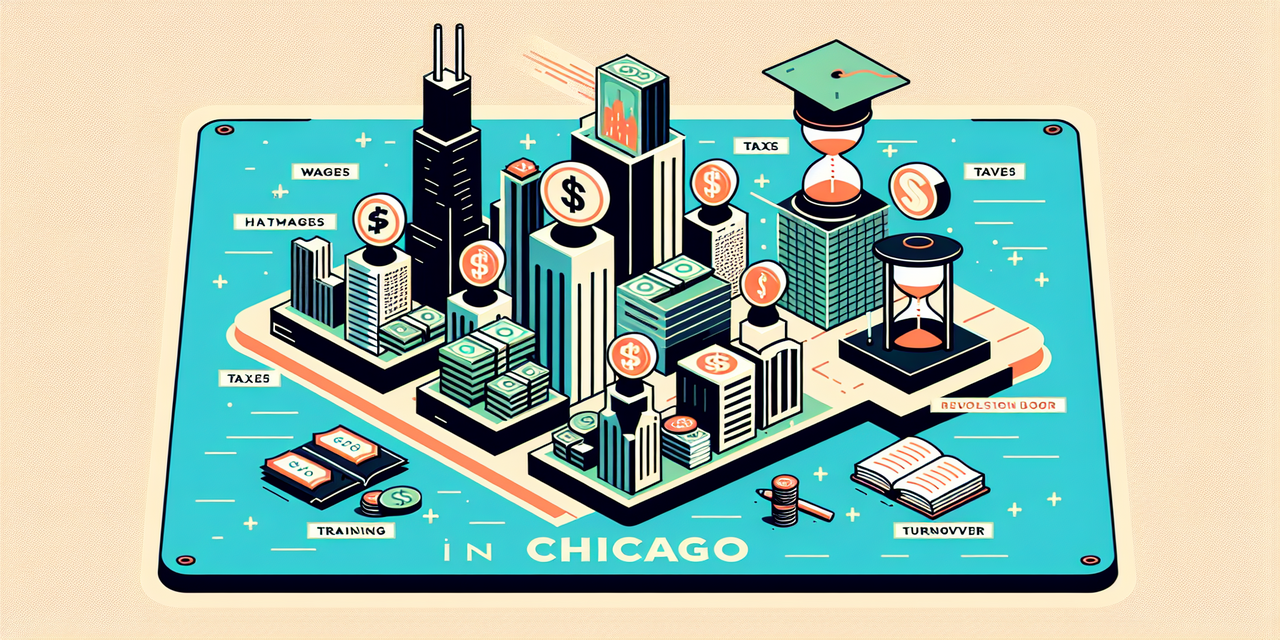Chicago Cost of Hiring Server: Key Takeaways
- Chicago’s minimum wage for servers is $12.00/hour, with actual server wages averaging around $18/hour plus tips.
- Employer payroll taxes add roughly 16% on top of base wages.
- Training a new server takes about 32 hours and includes direct and indirect costs.
- High turnover rates (75%–100%) can cost full-service restaurants up to $146,600 annually in replacement expenses.
Hiring a server in Chicago involves more than just wages. Employers must consider taxes, training investments, and turnover costs.
This article breaks down the key financial elements to help restaurants understand the true cost of employing servers in Chicago.
1. Chicago Server Wages
As of 2022, Chicago sets a minimum wage of $12.00 per hour. However, the living wage for a single adult in the city is estimated at around $18.42 per hour, reflecting the cost of living.
Most servers earn more than the minimum wage through a combination of base pay and tips. On average, servers make approximately $18 per hour before tips.
Tip earnings vary by establishment type. In casual and mid-range restaurants, servers typically receive $10 to 30 per hour in tips. Upscale venues often see tip rates of $50 to $90 per hour.
This means total hourly earnings for a server can easily range from $28 up to $108, depending on the venue and customer flow.
For restaurant owners aiming to hire the best talent, understanding how to attract and retain servers is crucial. Check out our guide on how to hire a server effectively for more insights.
2. Employer Taxes and Additional Costs in Chicago
Beyond wages, employers must cover payroll taxes. These include contributions to Social Security, Medicare, federal and state unemployment insurance, and workers' compensation.
On average, these taxes add about 16% to an employee's base salary. So, for a server earning $18 per hour, tax-related expenses add roughly $2.88 per hour, increasing labor costs substantially.
Employers should factor these taxes into budgeting to avoid underestimating the actual cost of employing servers.
For practical advice on managing restaurant payroll and taxes, see our post on tax tips for restaurant owners.
3. Training Expenses for New Servers
Training a server requires both time and resources. Onboarding involves direct expenses like training materials and trainer wages, as well as indirect costs such as reduced productivity during the learning curve.
Typically, training spans around 32 hours on the job. During this period, new servers may not perform at full efficiency, which impacts overall operational costs.
Investing in effective training is critical but adds to the total cost of hiring, especially when multiplied across multiple hires.
For comprehensive resources on server training, consider our server training manual template that can help structure your onboarding process.
4. Impact of Turnover on Chicago Restaurant Costs
The restaurant industry struggles with high employee turnover. Full-service restaurants see turnover rates between 75% and 100%, and quick-service restaurants often exceed 130% annually.
Replacing an hourly restaurant employee can cost between $2,000 and $5,000 when considering recruitment, onboarding, and training.
For full-service restaurants in Chicago, these turnover costs can total approximately $146,600 annually. This cost illustrates how maintaining stable staff is vital for financial health.
Explore effective strategies to reduce restaurant employee turnover to enhance staff retention and cut down on costly replacements.
5. Total Cost of Hiring a Server in Chicago
To contextualize these expenses, consider a server paid $18 per hour working 40 hours a week. The annual base wage would be $37,440.
Adding 16% for employer taxes raises the cost to around $43,430.
Including training and the expected average turnover costs pushes the total annual expense beyond $50,000 per server.
This comprehensive view emphasizes the significant financial investment restaurants make beyond just hourly wages.
6. Strategies to Manage Costs When Hiring Servers
Reducing turnover through improved workplace culture, competitive pay, and effective training programs can lower overall costs.
Investing in employee retention often leads to savings on recruitment and training expenses over time.
Monitoring tip income and ensuring compliance with wage laws help balance compensation effectively.
Restaurant managers can find valuable advice in our managing servers in a restaurant spotlight to optimize server productivity and satisfaction.
7. Useful Resources for Chicago Restaurant Employers
For detailed official information on wages and labor laws, consult these government resources:
- U.S. Department of Labor – Fair Labor Standards Act (FLSA)
- Illinois Department of Labor
- City of Chicago – Minimum Wage Ordinance
Additionally, learn about the cost of hiring employees and strategies to manage your labor budget effectively.
Chicago Cost of Hiring Server: Conclusion
Employing servers in Chicago involves multiple cost factors beyond wages, including taxes, training, and turnover impact.
Understanding and managing these components helps restaurant owners budget accurately and improve profitability.
Focusing on retention and efficient training can reduce turnover costs and support a stable, skilled serving staff.

.png)

.png)
.jpg)